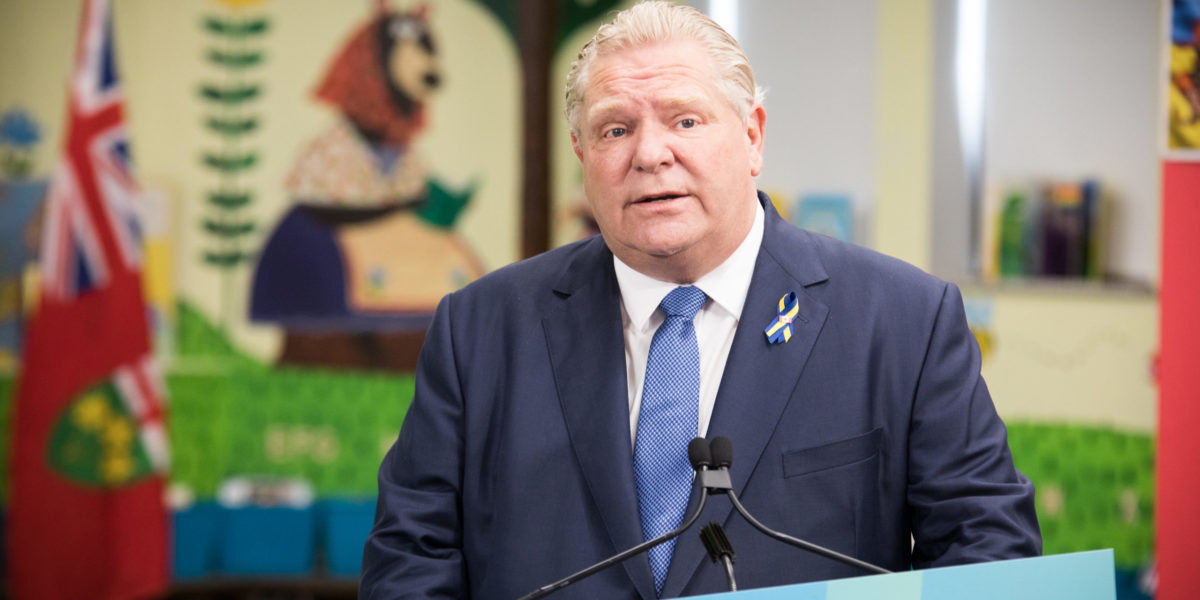There’s no shortage of hand-wringing about the plight of low-income workers caught in the web of high inflation.
Right-wing commentators never tire of telling the woeful tale of how inflation erodes their wages. They then happily use the workers’ sorry plight to justify pushing policies that are dear to their own hearts — like raising interest rates and cutting government spending — but will leave the worker worse off.
Meanwhile, they somehow overlook a simple solution that would actually help these suffering workers: pay them more!
This novel idea is far from the mind of our right-wing premier who’s opted to come down with a cudgel on the province’s lowly paid education support workers (teachers’ assistants, secretaries, custodians) rather than raise their pay so they can buy groceries at places other than Dollarama (which has aisles full of low-cost, packaged food for people, as well as dogs).
So Ford ordered MPPs to get up in the middle of the night this week to begin enacting legislation forcing these workers to accept the government’s terms in a four-year contract, and denying them the right to seek court action to ensure their collective rights under the Charter.
It seems heavy-handed, to say the least, to use this “nuclear option” against a group of lowly paid workers, with an average annual income of $39,000, many of whom are single mothers with children and are living below the poverty line.
Of course, it’s common to bemoan today’s extreme inequality; Canada now has more than 50 billionaires while workers struggle ever harder on poverty wages.
But this extreme inequality doesn’t just fall from the sky. It’s created by public policies, like doling out tax cuts for the rich and stripping workers of their collective bargaining rights — the one arrow workers have in their quiver.
Of course, Ford is prepping to take on his real target — teachers who, along with nurses and other public sector workers, have been held to a 1 per cent wage cap for the past three years. (Some in the public sector have been spared the cap, such as the 43 Conservative MPPs who were recently given a $16,600 raise by being appointed parliamentary assistants.)
The government’s usual excuse — the cupboard is bare, the deficit is raging, international creditors will cut us off and we’ll end up a banana republic — is harder to make this time, with Ontario recording an annual surplus of $2.1 billion, which is expected to grow to $8.5 billion in six years.
Of course, this is public money, and it must always be spent responsibly. But paying provincial employees fair wages is spending money responsibly. In addition to fairness, this is about strengthening our public systems.
The Ford government showed its indifference to public education in 2019 when it announced plans to cut the deficit by increasing class sizes. But, hold it right there; we know that small classes are a good thing. That’s why people pay for private tutoring — to enable their child to have more one-on-one time with a teacher.
So, by what logic would we want larger classes in our public schools? That’s our children we’d be shortchanging.
Overall, Ford has cut real funding to public education by $800 per student, notes political economist Ricardo Tranjan of the Canadian Centre for Policy Alternatives. The public sector is just another way of saying the public commons that belong to all of us.
Just as we have public parks and playgrounds that we share, our public education system is a public commons we’ve collectively created in order to ensure something vital — that our children all have access to high-quality education and that they learn civic virtues like co-operation and acceptance of others.
Cutting off vital funding, or needlessly turning this space into a combat zone, isn’t defending the public purse; it’s degrading the public commons.
The real problem with Ford is that he’s hostile toward the very idea of the public commons. Or maybe he just doesn’t get it. What’s the point of something if you can’t sell it, consume it or make a buck off it?
This column was originally published in the Toronto Star.



